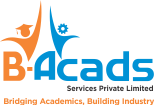Who are We?
B-Acads is a digital bridge between industry and academia, uniquely connecting the two and offering a distinct value proposition. It is designed to help both sides collaborate, solve real-world problems, and build meaningful relationships partnerships.
“Strong Industry-Academia partnership is needed as they are instrumental in advancing research and creating a skilled workforce” Dr. Rajkumar Ranjan Singh, Ex-Minister of State, Ministry of Education & Ministry of External Affairs
“Industry & Academia are ONE and hence they need to collaborate” Idris Jusoh ,Minister,Ministry of Higher Education, Malayasia .
Industry and academia can have a truly symbiotic relationship, allowing both to thrive and reach their individual goals. Each of them, have specific strengths and can add value to one another; however, the bridge that connects them is missing. B-Acads was created to be that link—a platform where insights, challenges, and ideas flow freely between companies and institutions. Because when the right minds connect, everyone benefits—organizations, faculty, academic institutions, students, and the world they’re preparing for.
When faculty and industry collaborate meaningfully, both stand to gain:
- Businesses access unbiased insights and cutting-edge thinking
- Faculty gain real-world context to enhance their research and teaching
- Students receive a far more relevant and applied education
B-Acads is the bridge that will give them access to each other, making industry-academia collaboration a two-way street.






